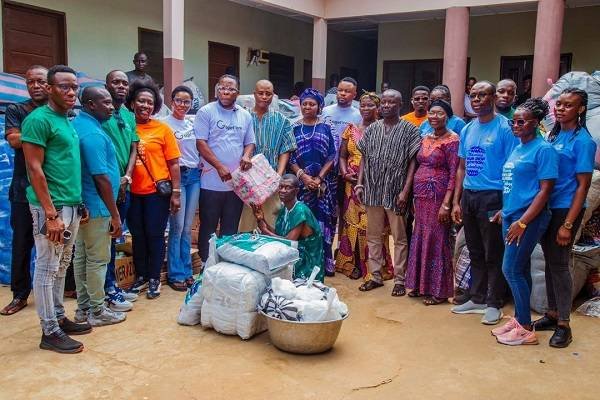Editorial
Edem, BH-FERTAGRO Limited donate relief items to Volta Region flood victims

Staff from BH-FERTAGRO limited donating the items to the paramount
Queen mother of MEPE Traditional Area.
The Managing Director of BH-FERTAGRO Limited, Ghana’s leading import, distributor and marketer of quality fertilisers and inputs, Mr Robert Kwabena Ayitey has partnered with musician Edem’s Goget’em Foundation to provide over GHȻ100,000 worth of relief items to the people of Mepe, Bator, Sogakope and the surrounding areas.
The gesture forms part of the company’s Corporate Social Responsibility (CSR) and also in response to the tragedy caused by the spillage of the Akosombo Dam in the Volta Region.
In an interview, Mr. Ayitey stated that, it was important to sympathise and help the flood victims.
The General Manager of the company, Mr Alex Kwame Donyinah also expressed concerns about how the affected people could come back to their daily livelihood without getting support from Corporate Ghana.
“As a leading agro company, we are ready to ensure we provide the needed support in terms of fertilizers and other farm inputs to ensure that these affected areas see growth and restoration in the tragedy.”
Musician Edem known in private life as Denning Edem Hortor who has been very instrumental in organising relief items to the affected areas expressed his gratitude to the company for taking such a step to support the people in the affected areas.
The Paramount Queen of Mepe Traditional Area, Mamaga Adzo Sreku IV and Mankrado, Torgbe Korsi Nego VI who received the items on behalf of the victims expressed their gratitude to BH-FERTAGRO and Edem.
Editorial
Don’t use polythene bags to store hot, oily foods
Ghanaians have been advised to refrain from putting hot or oily foods in plastic bags because it poses major health risks.
The warning states that storing hot foods in polythene bags, especially ones that are not made for food storage can cause dangerous chemicals to leak into the food, which could be dangerous for one’s health.
Professor Esther Sakyi-Dawson, an Associate Professor of Food Science at the University of Ghana, gave this warning at a World Food Safety Day celebration in Accra on Tuesday.
With the theme “Food Safety: Science in Action,” this year’s World Food Safety Day focused on the critical role that scientific knowledge plays in guaranteeing food safety and fostering confidence in the food supply.
According to Prof. Sakyi-Dawson, when plastics are heated, toxic substances can seep into the food, contaminating it and raising the risk of several chronic illnesses, including hormone imbalances, reproductive problems, and even some types of cancer, which are on the rise in the nation.
According to estimates from the World Health Organisation (WHO), food contamination causes over 400,000 deaths annually and 600 million foodborne illness cases.
Also, a third of all deaths worldwide are caused by foodborne illnesses, which affect at least 91 million people in Africa each year. Of these, 40 percent are in children under the age of five.
Given the concerning statistics, there is an urgent need to raise awareness that eating hot foods like banku, rice, waakye, or “koko” (porridge) wrapped in plastic is extremely harmful to one’s health.
It is more important to avoid putting food in black plastics, which are not food quality and are typically used for carrying items. Similarly, white polythene should not come into close contact with food.
Despite the warning, Ghanaians have been urged to watch out for food-grade plastics, which are frequently thick, to use for food packing and storage as needed
Since “to be forewarned is to be forearmed” The Spectator advises consumers to put their health first by making the appropriate choices about what they put into their bodies for their own safety.
Editorial
Ensure safety of children during rainy seasonfacilities

Dear Editor,
I write to express concern about the safety of school-going children during these unpredictable weather conditions.
Many children walk long distances to get to school on roads which are mostly poorly drained.
Also, the combination of low visibility, slippery surfaces, and increased vehicular traffic during rains presents real risks to their health and safety.
While I urge local authorities to improve road infrastructure and pedestrian protections around schools, I wish to especially appeal to parents and guardians to take proactive steps in safeguarding their children during this season.
Parents should ensure their children are dressed properly in waterproof or warm clothing, including raincoats, boots, and umbrellas where possible.
Also, parents should accompany younger children to school when it is raining or overly windy, or arrange for responsible adults to do so.
Again, I urge parents to teach their children basic road safety and help them identify the safest routes to school.
In my view, I think it will be prudent to delay leaving the house when rain is heavy or visibility is poor, even if it means arriving at school later and safer.
It is important to remember that safety begins at home. While schools and government agencies have a role to play, parents and caregivers, must not leave the protection of our children to chance.
I believe that with shared responsibility between the state and the family, avoidable accidents could be prevented and ensure every child makes it to school and back home safely.
Abui, Korle Gonno






